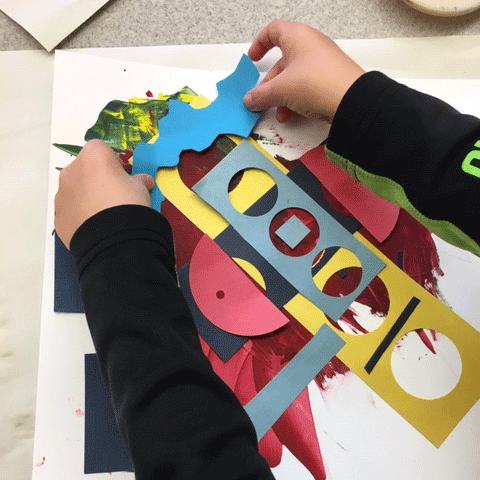
Shapes and Colors
Supplemental resources
Workshop overview
Available for Pre-K – Grade 1.
Students discover shapes and colors while engaging in a developmentally appropriate tour of the Nelson-Atkins galleries. In the studio classrooms, students will paint and collage to create a mixed media work of art. All supplies will be provided.
Outcomes
- Students will create a collage integrating shapes, colors, and lines.
- Students will identify primary and secondary colors.
- Students will demonstrate mixing primary colors to achieve a secondary color.
Curriculum
- Organize and develop artistic ideas and work.
- Build skills in various media and approaches to art making.
- Use observation and investigation in preparing for making a work of art.
Vocabulary
- Primary Colors – Red, yellow, and blue- colors that cannot be created by mixing other colors
- Secondary Colors – Orange, green, and violet- colors made by mixing two primary colors
- Collage – A piece of art made by attaching various materials together
- Organic Shapes – Free-form shapes like those found in nature
- Geometric Shapes – Shapes based on math principles, such as square, circle, and triangle
- Pattern – Something that repeats in a predictable way
- Line Variety – When an artist places different types of lines in the same composition. For example, straight, curvy, zigzag, dashed, etc.
- Location Words – Behind, beside, inside, around, left, right, below, above
Pre-Workshop Activities
- Read a book to your class about colors and shapes. Some suggestions include: Little Blue and Little Yellow by Leo Lionni, Mouse Paint by Ellen Stoll Walsh, White Rabbit’s Color Book by Alan Baker, A Book About Color by Mark Gonyea, Round is a Mooncake by Roseanne Thong and Shapes, Shapes, Shapes by Tana Hoban.
- Practice using “location words” included in the vocabulary list to prepare the students for exploring and talking about artwork in the galleries.
- Play a color/shape matching game with a handmade deck of cards. Paint swatches from hardware stores can make easy color matching cards.
Post-Workshop Activities
- Have students use pre-cut shapes to create various objects, buildings, animals, or people. Invite students to share about their shape creations.
- Set up a painting station and allow students to paint using the primary colors: red, yellow, and blue. Discuss the new colors created. Do they remember the primary colors used to make each of the new colors? Can they find and name the 3 secondary colors: orange, green, and purple?
- Cut geometric shapes from different materials, such as corrugated paper, fabric, or sandpaper. Place them in a box or bag and ask students to feel the shape and guess what it might be.
- Go on a color treasure hunt. Have students categorize a collection of colorful toys into color groups. Ask which groups are primary colors and which are secondary.